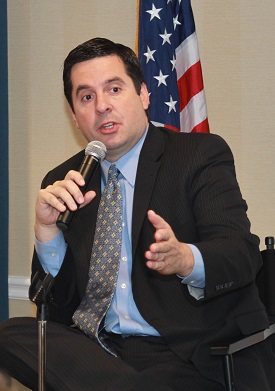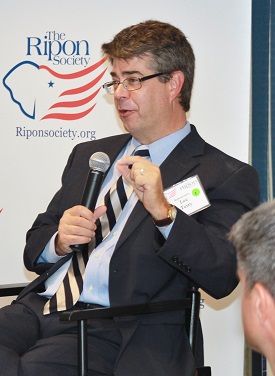Terry and Nunes Discuss Government Shutdown and the U.S. Trade Agenda

WASHINGTON, D.C. – Representatives Lee Terry (NE-2) and Devin Nunes (CA-22) appeared at a breakfast meeting of The Ripon Society this past Tuesday morning to discuss the U.S. trade agenda – an issue that, like so many others, has gotten overshadowed by the current government shutdown, but one that is critical to future U.S. economic growth. “I don’t know how long this shutdown is going to go,” Nunes stated. “But the longer it goes, the farther we fall behind on trade issues and other issues that we need to get to.” Nunes is a longtime trade proponent who is serving his first term as Chairman of the Ways & Means Subcommittee on Trade. In addition to discussing the effects of the government shutdown, he also discussed why it is important for Congress to pass Trade Promotion Authority, and the apparent lack of urgency by the President in getting it approved.
“I’m getting concerned that there’s not a lot of pressure from the Administration on TPA,” the California lawmaker stated. “I don’t think they want much input from Congress. They just assume that they’re going to come to Congress and they’re going to say, ‘Here, we got this done — now pass it!’ I will say that the U.S. Trade Representative does do a good job of keeping us informed on the committee. However, there are a lot of other Members that need to be informed too.”
“The thing that Members need to understand is that even if they’re not going to be for the trade agreements, they should be for TPA. Because without that, you have an Administration that is going to do whatever they want to do, without any guidance by the Congress.”
Terry — who is also a longtime trade advocate and serves as Chairman of the Energy & Commerce Subcommittee on Commerce, Manufacturing, and Trade – echoed his colleague’s remarks about the importance of keeping the focus on the U.S. trade agenda, and discussed the effort he is leading on his own panel to encourage U.S. exports and protect American innovation in Europe and elsewhere abroad.
“I believe that our trade agreements really give us an opportunity to expand our economy and — by doing so — grow jobs,” he stated. “We have focused on U.S. manufacturing — particularly in steel, in auto manufacturing, pharmaceutical, and technology. All have policy issues that we need to resolve. We’ll start hearings later this fall and early next spring on auto safety, and looking at where Europe is on their policies with regard to medical devices. Frankly, I think there’s room for us to recognize or work with their medical association on their ability to get drugs to the market quicker than the U.S.”

“We’re focused for example on the artificial pancreas. It’s been in use in Europe for years, but yet our own FDA won’t even recognize their data or use their data. So I think there’s room where we can improve there. When we get to technology — that is one area that I really believe we don’t need to harmonize. They are so focused on the individual and protecting privacy. There is a reason we are responsible for 99% of the [world’s] innovation … Does anybody know what the U.S. privacy policy is? Neither do I. That’s because there really isn’t a national policy. Frankly, the fact that we haven’t passed laws or developed a hardcore privacy policy has really allowed innovation to flourish. I think that is a lesson we need to focus on, and maybe teach the Europeans about.”
“When we get to the Pacific, it is more about forcing them — whether it’s India or others — to really recognize the importance of our intellectual property and protections. When you have a country like India — when an American pharmaceutical company moves there — just take over the patent and start manufacturing it and start exporting. And yet we’re doing virtually nothing in this country to stop that.”
To that end, the Nebraska Republican noted that he introduced a bill on September 20th, called the Playing Fair on Trade and Innovation Act, that would address this problem by blocking duty-free access to U.S. markets for countries without adequate intellectual property protection.
Nunes concluded by reiterating the importance of keeping other Members of Congress engaged on these and other trade-related issues.
“I think it’s so necessary to educate Members about what’s going on,” he stated. Referring to the TransPacific Partnership and the Transatlantic Trade and Investment Partnership, he added: “We have two major agreements that are being negotiated right now. Look, we are a little bit like little kids soccer — we just follow the ball. That’s Congress, right? We just move around. If the President came out and gave a big speech and said, ‘We’re going to do a trade agreement next week,’ all of a sudden we’d all be focusing on that.
“It doesn’t help you if you don’t have Members engaged in your issues. And we’ve got a whole host of issues that are starting to reach the pinnacle where decisions have to be made. That’s why we’re trying to go out on TPA and see if we can get the votes and see if that’s a way we can steer the Administration in the right direction and have them actually listen to the Congress.”
The Ripon Society is a public policy organization that was founded in 1962 and takes its name from the town where the Republican Party was born in 1854 – Ripon, Wisconsin. One of the main goals of The Ripon Society is to promote the ideas and principles that have made America great and contributed to the GOP’s success. These ideas include keeping our nation secure, keeping taxes low and having a federal government that is smaller, smarter and more accountable to the people.



